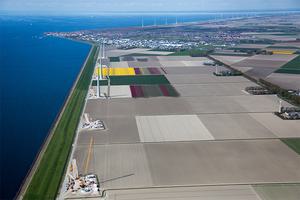Climate
-
Will Indonesian Fires Spark Reform of Rogue Forest Sector?
Massive fires in Indonesia caused by the burning of forests and peatlands for agriculture have shrouded large areas of Southeast Asia in smoke this fall. But analysts say international anger over the fires could finally lead to a reduction in Indonesia’s runaway deforestation.
-
The Sushi Project: Farming Fish And Rice in California’s Fields
Innovative projects in California are using flooded rice fields to rear threatened species of Pacific salmon, mimicking the rich floodplains where juvenile salmon once thrived. This technique also shows promise for growing forage fish, which are increasingly threatened in the wild.
-
How ‘Third Way’ Technologies Can Help Turn Tide on Climate
In a Yale Environment 360 interview, Australian scientist and author Tim Flannery explains how the development of technologies that mimic the earth’s natural carbon-removing processes could provide a critical tool for slowing global warming.
-
A Delicate Balance: Protecting Northwest’s Glass Sponge Reefs
Rare and extensive reefs of glass sponges are found only one place on earth — a stretch of the Pacific Northwest coast. Now, efforts are underway to identify and protect these fragile formations before they are obliterated by fishing vessels that trawl the bottom.
-
As the Fracking Boom Spreads, One Watershed Draws the Line
After spreading across Pennsylvania, fracking for natural gas has run into government bans in the Delaware River watershed. The basins of the Delaware and nearby Susquehanna River offer a sharp contrast between what happens in places that allow fracking and those that do not.
-
The Rapid and Startling Decline Of World’s Vast Boreal Forests
Scientists are becoming increasingly concerned about the fate of the huge boreal forest that spans from Scandinavia to northern Canada. Unprecedented warming in the region is jeopardizing the future of a critical ecosystem that makes up nearly a third of the earth’s forest cover.
-
Rallying Hip Hop Culture For A More Inclusive Climate Fight
In an interview with Yale Environment 360, the Rev. Lennox Yearwood — a social and environmental activist and the head of the Hip Hop Caucus — explains why it’s vital that the climate and environmental movements become far more diverse.
-
How China and U.S. Became Unlikely Partners on Climate
Amid tensions between the U.S. and China, one issue has emerged on which the two nations are finding common ground: climate change. Their recent commitments on controlling emissions have created momentum that could help international climate talks in Paris in December.
-
Northern Forests Emerge As the New Global Tinderbox
Rapidly rising temperatures, changes in precipitation, and increased lightning strikes are leading to ever-larger wildfires in the northern forests of Alaska, Canada, and Siberia, with potentially severe ecological consequences.
-
For U.S. Tribes, a Movement to Revive Native Foods and Lands
On ancestral lands, the Fond du Lac band in Minnesota is planting wild rice and restoring wetlands damaged by dams, industry, and logging. Their efforts are part of a growing trend by Native Americans to bring back traditional food sources and heal scarred landscapes.
-
How One African Village Learned To Live with Its Wildlife and Prosper
The second runner-up in the Yale Environment 360 Video Contest tells the story of the residents of a forest village in central Mozambique who have helped create a tourist destination centered on an elephant population that once wreaked havoc in their community.
-
One Scientist’s Hopeful View On How to Repair the Planet
Ecological crises may be piling up in a seemingly hopeless cascade, but Swedish scientist Johan Rockström says the next few decades offer an unparalleled opportunity to undo the damage.
-
Beyond Sprawl: A New Vision of The Solar Suburbs of the Future
The concept of the "solar suburb" includes a solar panel on every roof, an electric vehicle in every garage, ultra-efficient home batteries to store excess energy, and the easy transfer of electricity among house, car, and grid. But will the technological pieces fall in place to make this dream a reality?
-
What Pope Francis Should Say In His Upcoming UN Address
Pope Francis will speak to the United Nations General Assembly on Sept. 25 about poverty, the environment, and sustainable development. In a Yale Environment 360 forum, seven leading thinkers on the environment and religion describe what they would like to hear the pope say.
-
Will the Paris Climate Talks Be Too Little and Too Late?
At the upcoming U.N. climate conference, most of the world’s major nations will pledge to make significant reductions in greenhouse gas emissions. But serious doubts remain as to whether these promised cuts will be nearly enough to avoid the most severe impacts of climate change.
-
Rachel Carson’s Critics Keep On, But She Told Truth About DDT
More than half a century after scientist Rachel Carson warned of the dangers of overusing the pesticide DDT, conservative groups continue to vilify her and blame her for a resurgence of malaria. But DDT is still used in many countries where malaria now rages.
-
Natura 2000: EU Reserves Are Facing Development Pressures
An astonishing 18 percent of the European Union’s land area is protected under a network of preserves known as Natura 2000. Now, at the urging of business interests and farmers, the EU is examining whether regulations on development in these areas should be loosened.
-
Global Extinction Rates: Why Do Estimates Vary So Wildly?
Is it 150 species a day or 24 a day or far less than that? Prominent scientists cite dramatically different numbers when estimating the rate at which species are going extinct. Why is that?
-
With Warming, a Terrifying New Normal for Firefighters
A Yale Environment 360 video goes onto the front lines with Colorado fire crews who have watched as massive, months-long wildfires have become a regular occurrence in their state.

